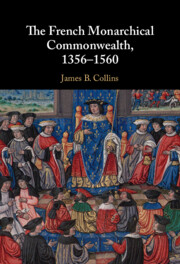Book contents
- The French Monarchical Commonwealth, 1356–1560
- The French Monarchical Commonwealth, 1356–1560
- Copyright page
- Contents
- Illustrations
- Preface
- Introduction
- 1 La chose publique de nostre royaume
- 2 Political Vocabulary in Action
- 3 Murder, Justice, and la chose publique in an Age of Madness
- 4 The Commonwealth under Siege
- 5 The chose publique and Urban Government
- 6 The Orléanist Offensive
- Conclusion
- Bibliography
- Index
6 - The Orléanist Offensive
Puissance absolue and Republicanism
Published online by Cambridge University Press: 05 May 2022
- The French Monarchical Commonwealth, 1356–1560
- The French Monarchical Commonwealth, 1356–1560
- Copyright page
- Contents
- Illustrations
- Preface
- Introduction
- 1 La chose publique de nostre royaume
- 2 Political Vocabulary in Action
- 3 Murder, Justice, and la chose publique in an Age of Madness
- 4 The Commonwealth under Siege
- 5 The chose publique and Urban Government
- 6 The Orléanist Offensive
- Conclusion
- Bibliography
- Index
Summary
The Estates General of 1484 laid out a clear statement of commonwealth principles, largely followed by Charles VIII and Louis XII. Francis I, however, set out to undermine these commonwealth elements. With the Concordat of Bologna (1516), he gained the right to name successors to most French benefices, a tool kings would use as their most effective patronage weapon. The institutional thickening under Francis I and Henry II transformed the meaning of many traditional phrases. The regional noble elite and the legal hierarchy, led by the Parlements, developed mutually contradictory understandings of the “commonwealth” element of the monarchy. By the time of the Estates General of 1560, local elites wanted a codified return to a commonwealth whose principles had been effectively abandoned.At the Estates General of Orléans (1560–1561), they would lay out clearly a system built on elections: of bishops, abbots, priors, noble baillis, judges, town governments, and deputies to periodic meetings of bailiwick and national estates. The central judicial elite and the monarchy made sure this system never became operative. Together, the monarchy and the central judicial elite would develop a political vocabulary built around the “good of the State.”
Keywords
- Type
- Chapter
- Information
- The French Monarchical Commonwealth, 1356–1560 , pp. 228 - 264Publisher: Cambridge University PressPrint publication year: 2022

